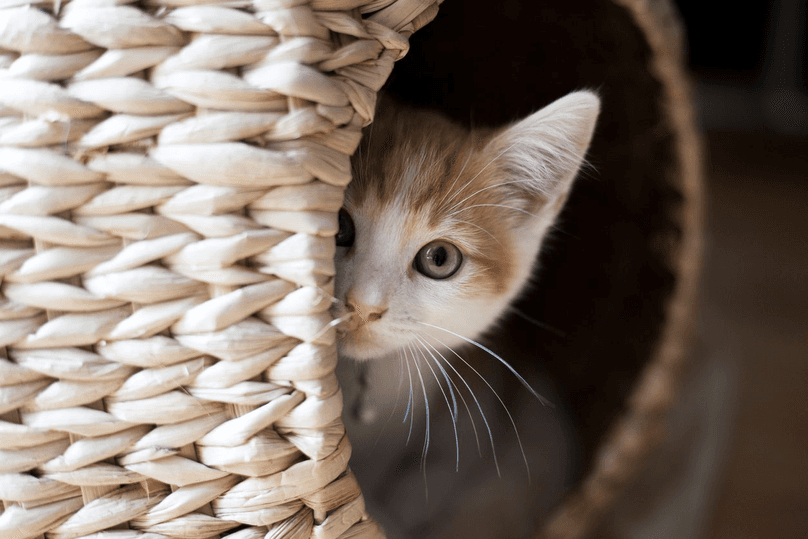
Any cat parent knows that cats can be highly sensitive creatures. Most of them don’t like change, many are picky eaters, and even the most laid back feline can throw out a hiss if they’re annoyed enough. But what do you do when your cat’s sensitive nature extends beyond the norm?
Anxiety in cats is not uncommon, usually cropping up around 6 months to 1 year of age. It runs along a spectrum—which can range from mild to severe. However bad your cat’s anxiety may be, you probably want to help alleviate it. So the question is, how do you calm an anxious cat?
Signs of Anxiety in Cats
It’s helpful to first know how anxiety may present itself in our kitties. While it may look drastically different from one feline to another (just like in people), there are a few sure signs that your cat is in more distress than they should be. Signs of anxiety in cats may include:
- Shying away from physical contact
- Dilated pupils
- Ears laid flat or held out to the side
- Hair standing on end
- Tense body language
- Hissing, growling, or other aggressive vocalizations and behaviors
Remember that these are only a baseline. You know your kitty best: If something startles them or they’re acting out of sorts, anxietymightbe the issue.
How to Calm an Anxious Cat: Tips, Tricks, and Hacks
There are several methods for how to calm an anxious cat, but first, let’s cover a few things youshouldn’ttry:
- Do not try to pick your anxious kitty up or force physical contact. Anxious cats are on edge already and may interpret your approach as a threat. Give them some space, talk to them soothingly, and try to entice them to come to you if they’re willing.
- Do not try to force exposure to the triggering stimulus. If you know what makes your kitty anxious, it’s best to remove that stimulus from their environment as soon as possible.
- Do not try to punish your cat for the anxious behavior. Even raised voices or squirts from a water bottle may enforce your cat’s fear and make their reaction worse the next time around.
Now that that’s out of the way, here’s what you can do tohelpyour cat deal with anxiety.
Respect their boundaries.First and foremost, make sure your cat feels safe in their own home. As you can imagine, this tip can encompass a wide range of advice but, in general, you want to create an environment where your cat feels at ease.
This starts with building a healthy and loving relationship with your cat. Respecting their boundaries and avoiding undue stress can go a long way toward removing some of your cat’s anxiety.
For instance, everyone laughs at the cat and cucumber videos, but this little prank can lead to long-term stress for your kitty, which can morph over time into permanent anxiety and/or aggression.
Along those same lines, forcing your cat to accept pets or picking them up when they’re not open to it can create distrust between you and your kitty. Cats are creatures that like to give permission and many will grant it often if they trust you, but you should aim to earn that trust and accept it when your cat is just not in the mood.
Give them their own space.Closely related to respecting your cat’s boundaries is granting them their own safe space in the house where they know they won’t be bothered. If you have dogs or young kids, this might mean setting aside a room or closet space where your cats can go when they don’t want to be bothered.
Installing cat doors in a wall is a good way to ensure this space remains quiet and undisturbed, but there are also door latches you can buy that will allow your kitty to slip through while restricting access to anything larger. You can make the space even more comfortable with cat caves, cozy blankets, and toys.
Keep changes gradual when you can.Next up, it’s no secret that most cats hate change. Change brings with it a sense of lost control and a fear of the unknown.
When possible, making change gradually can help minimize your cat’s stress levels and the anxiety that comes with it. This is also where your kitty’s safe space comes into play. Even if you have to make big changes in other areas of the house, as long as their space remains undisturbed, they’ll be able to retreat somewhere comfortable.
Take proactive and preventative measures.The next thing you can do to alleviate some of your cat’s anxiety is to plan ahead. If you know your kitty will have to deal with triggering stimuli (e.g. fireworks, visitors, handymen, etc.), you can take steps to ensure that your cat is safely tucked away in their own room where they won’t be bothered.
Alternatively, if the stimulus is going to remain outside the house, you can turn on soothing music or white noise that might promote a sense of calm.
Try OTC products to promote calmness.At the end of the day, your kitty might need some extra help to alleviate their anxiety. There are plenty of vet-approved sprays, diffusers, and calming wipes that help your cat feel calmer and more relaxed. Supplements and nutraceuticals are also viable options.
If all else fails, talk to your veterinarian. Finally, if you’ve exhausted these tips and you’re still left wondering how to calm an anxious cat, the best thing you can do is ask your vet. Not only can your vet prescribe medication if OTC products and other methods aren’t working, but they can also determine whether your cat’s anxiety might be linked to some underlying health issue that hasn’t been addressed.
When all is said and done, remember that anxiety is just as unpleasant for our cats as it is for us. Handling it with patience, understanding, and compassion will go a long way.